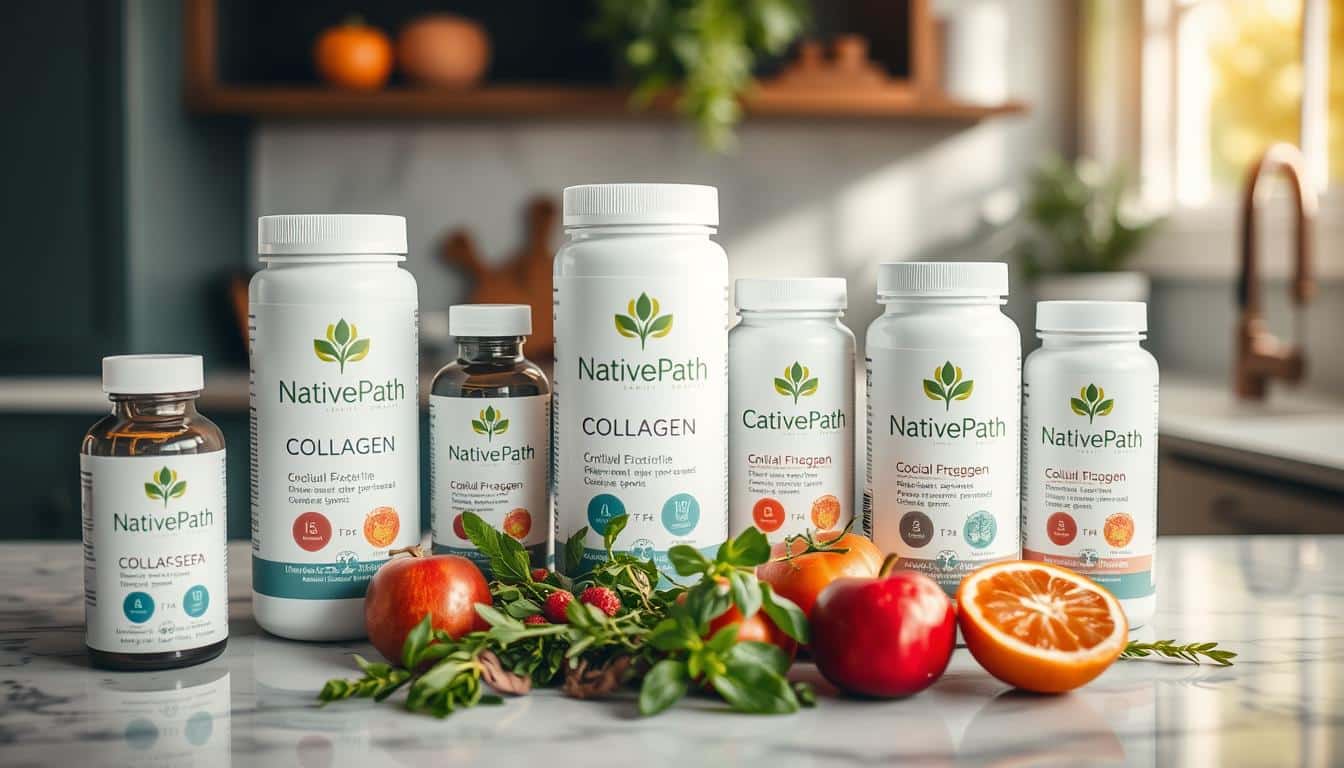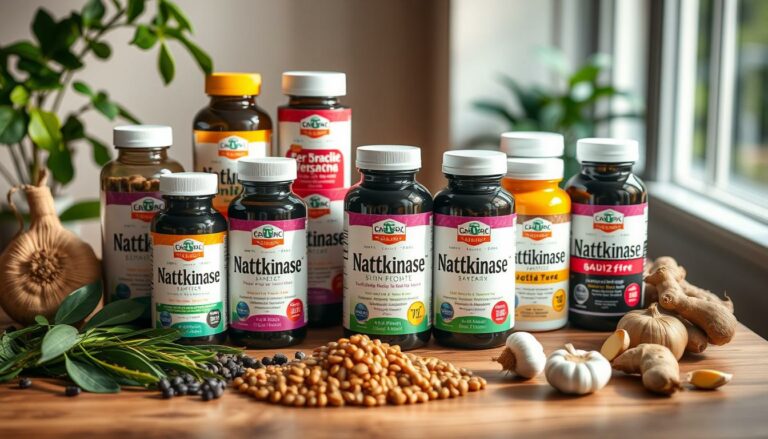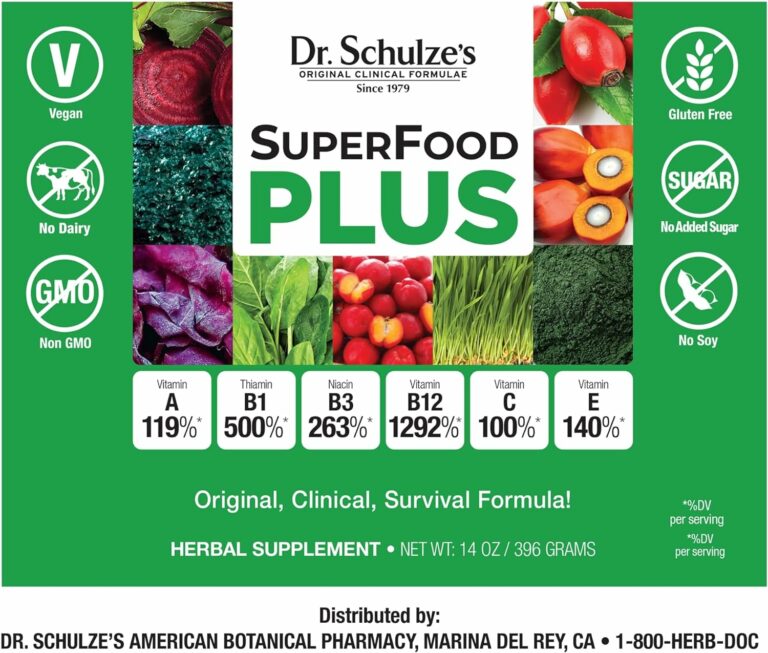Best Collagen for Skin: Benefits and Top Picks
Do you remember when we didn’t worry about our skin’s elasticity? Now, we all want that youthful glow back. Collagen is like nature’s anti-aging magic, helping our skin and health.
Starting in our 30s, our bodies make less collagen. This can cause wrinkles and sagging skin. But, collagen supplements can help fight these signs and support our skincare.
We’ve looked into the science and tried many products. The right collagen can make our skin tighter, smoother, and healthier. But, picking the best one can be hard.
This guide will help you understand collagen’s benefits and types. We’ll also share our top picks after thorough testing. Whether you’re new to collagen or looking to improve your routine, we’ve got you covered.
Key Takeaways
- Collagen production naturally decreases by 1-2% annually after age 30
- Collagen supplements can improve skin elasticity and reduce wrinkles
- Daily recommended doses range from 2.5 to 15 grams for optimal benefits
- Results may take 8 weeks to 12 months to become noticeable
- Different types of collagen (I-IV) offer various benefits for skin and body
- Top-rated collagen supplements were selected after testing 23 products
What is Collagen and Why is it Important for Skin?
Collagen is a key protein for our skin’s health. As we get older, our bodies make less collagen. This shows in our skin’s aging signs. Knowing about collagen helps us choose better skincare.
The Role of Collagen in Skin Health
Collagen is a big part of our skin’s connective tissue. It keeps our skin strong and elastic. But, our collagen levels drop after we’re 25, falling by 1-2% each year after 30.
Types of Collagen and Their Benefits
There are many types of collagen, each with its own benefits:
- Type I: Most found in skin, tendons, and ligaments
- Type II: Good for joint health
- Type III: Helps muscles recover and keeps skin healthy
- Type IV: Keeps skin healthy overall
Natural Sources of Collagen
We can get more collagen from food and supplements. Here are some natural sources:
- Bone broth: Full of collagen and nutrients
- Fish and shellfish: Have marine collagen
- Citrus fruits: Full of vitamin C, key for making collagen
- Leafy greens: Have antioxidants that protect collagen
Eating these foods and using collagen supplements can help our skin. A good skincare plan includes both what we eat and how we care for our skin.
Benefits of Collagen for Skin
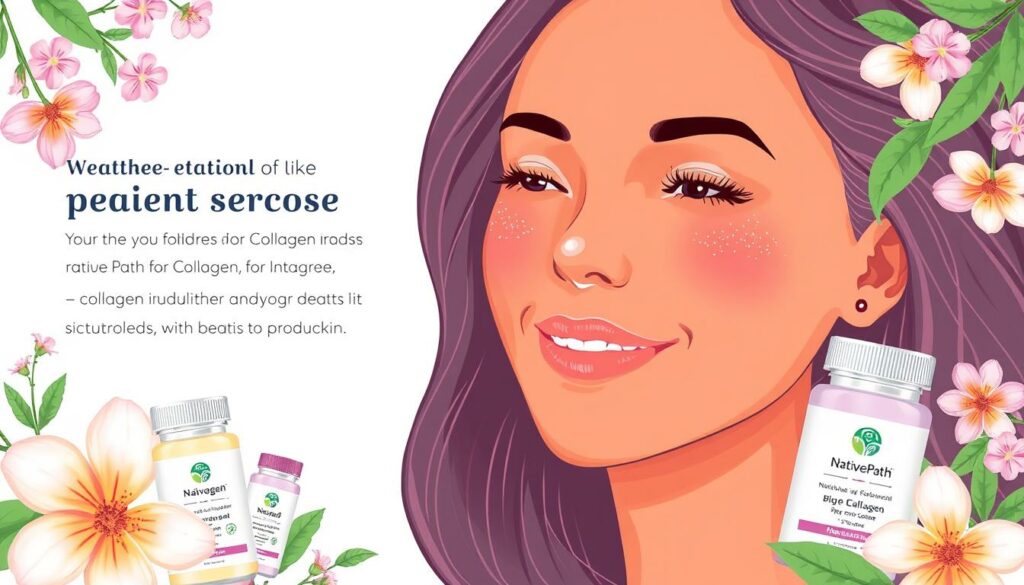
Collagen is a key protein in our bodies. It’s very important for our skin. As we get older, we make less collagen. This leads to signs of aging.
Collagen supplements can help. They can make our skin look younger and healthier.
Promoting Skin Elasticity and Firmness
Collagen peptides are great for skin elasticity. They are small and easy for our bodies to use. They help our skin feel bouncy and firm again.
Using collagen supplements regularly can make our skin look better. It can make our skin less saggy and look more youthful.
Reducing Fine Lines and Wrinkles
Collagen is also good for reducing fine lines and wrinkles. It helps make our skin plump up again. This makes our skin look smoother.
Many people see big changes in their skin after using collagen. They notice their skin looks better in just a few weeks.
Hydration and Overall Skin Appearance
Collagen peptides do more than just fix the surface of our skin. They help our skin stay hydrated from the inside. This makes our skin look more radiant and youthful.
“I’ve been using collagen peptides for two months, and my skin feels so much more supple and hydrated. It’s like I’ve found my own personal fountain of youth!” – Sarah, 45
Collagen supplements are very popular for good reason. They can help smooth out wrinkles, make our skin more elastic, and make our skin look brighter. Collagen could be the secret to making our skin look its best.
Different Forms of Collagen Supplements
Collagen supplements come in many types. Each one has its own benefits for your skin. Let’s look at the most popular ones and what they offer.
Collagen Powders
Collagen powders are easy to mix into drinks or foods. They often have hydrolyzed collagen. This makes them easier for your body to absorb.
You can add them to smoothies, coffee, or even baked goods. They’re a great way to get more collagen.
Collagen Peptides
Collagen peptides are a type of hydrolyzed collagen. They’re broken down into smaller amino acids. This makes them easier for your body to use.
They dissolve well in both hot and cold liquids. This makes them easy to use every day.
Liquid Collagen Supplements
If you like a drinkable option, liquid collagen supplements are perfect. They’re pre-mixed and often come in flavors. This makes them easy to drink on the go.
They’re great for people who are always busy. They help you add collagen to your daily routine easily.
| Supplement Form | Absorption Rate | Convenience | Versatility |
|---|---|---|---|
| Collagen Powders | Good | High | Very High |
| Collagen Peptides | Excellent | High | High |
| Liquid Collagen | Good | Very High | Low |
Choosing the right collagen supplement depends on your lifestyle and what you like. Whether you choose a powder, peptide, or liquid, adding collagen to your daily routine can help your skin and overall health.
How to Choose the Right Collagen Supplement
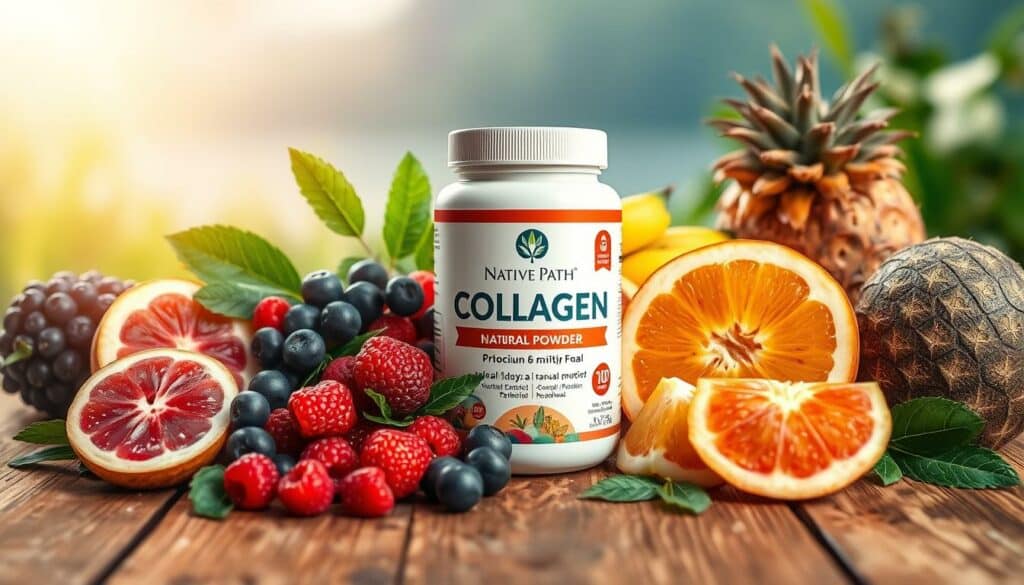
Finding the right collagen supplement can be hard. There are many choices out there. Knowing what to look for is key for your skin and health.
Key Ingredients to Look For
Look for high-quality collagen sources. Grass-fed and marine collagen are good choices. Grass-fed collagen is good for joints and gut. Marine collagen is best for skin, hair, and nails.
Sourcing and Quality Standards
Quality matters a lot. Look for third-party certifications like NSF Certified for Sport or Informed Choice Certified. These show the product meets high standards. Also, check if the collagen is from sustainable sources. Marine collagen is more sustainable and good for pescatarians. Grass-fed bovine collagen is widely available.
Dosage Recommendations
Dosage varies, but usually is 2.5 to 15 grams daily for skin and joints. Start with a small dose and increase slowly. Being consistent is important for seeing results.
| Collagen Type | Main Benefits | Recommended Dosage |
|---|---|---|
| Marine Collagen | Skin, hair, nail health | 2.5 – 15g daily |
| Grass-fed Collagen | Joint, muscle, gut health | 2.5 – 15g daily |
Choose a collagen supplement that fits your health goals. Whether it’s for skin or joints, the right collagen can help. Remember, collagen isn’t a magic cure. But it’s scientifically proven to help your body.
Top Collagen Supplements for Skin in 2023
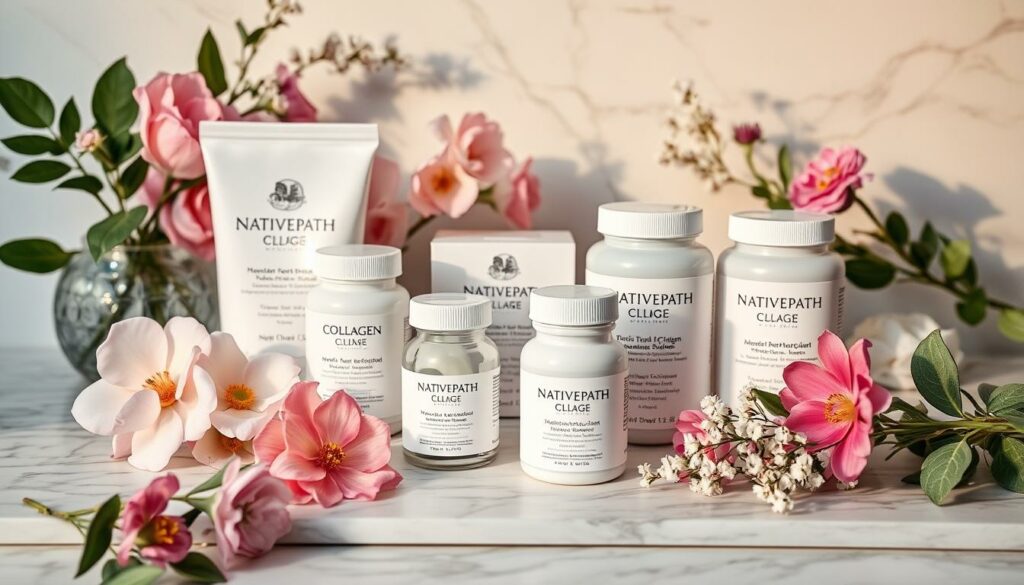
Many people look for ways to keep their skin young. As we get older, our bodies make less collagen. But, there are great supplements that can help. Let’s look at some of the best collagen brands and what they offer.
Product Recommendations with Benefits
Some collagen products really stand out. Vital Proteins Collagen Peptides has 20g of collagen in each serving. Orgain and Further Food also have 20g each. Ancient Nutrition Multi Collagen Protein Powder has 10g per serving.
These supplements help with joint health, reduce wrinkles, and make skin better overall.
Comparison of Price and Quality
| Brand | Collagen per Serving | Key Benefits |
|---|---|---|
| Vital Proteins | 20g | Joint flexibility, skin elasticity |
| Orgain | 20g | Grass-fed, supports cartilage health |
| Further Food | 20g | Promotes healthy collagen production |
| Ancient Nutrition | 10g | Multi-collagen blend, diverse benefits |
User Reviews and Testimonials
What people say about these products is very important. They have a 4.2 out of 5 rating from 163 reviews. Almost all customers say they highly recommend these brands.
Many say their skin looks better, they feel less joint pain, and their nails and hair are stronger.
When looking at collagen options, remember that some supplements help the gut too. This can also make your skin look better. Always talk to a doctor before trying new supplements.
Collagen-Rich Foods for Natural Skin Care
Eating the right foods can boost your body’s natural collagen production. Let’s explore some dietary collagen sources that can enhance your skin health.
Bone Broth and Its Nutritional Value
Bone broth is a powerhouse of natural collagen sources. Simmering bones for hours releases collagen and other nutrients. This tasty broth provides amino acids that support skin elasticity and hydration.
Fish and Shellfish for Collagen
Fish and shellfish are excellent sources of dietary collagen. The skin and bones of fish are rich in marine collagen. Salmon, cod, and tuna are top choices. Shellfish like shrimp and crab also pack a collagen punch.
Fruits and Vegetables Supporting Collagen Production
Many fruits and veggies are collagen-boosting foods. Citrus fruits, berries, and leafy greens are high in vitamin C, which aids collagen synthesis. Garlic supports collagen production and protects against damage.
| Food Category | Examples | Collagen Benefit |
|---|---|---|
| Bone Broth | Chicken, beef, fish | Direct source of collagen |
| Fish | Salmon, cod, tuna | Rich in marine collagen |
| Shellfish | Shrimp, crab | Contains marine collagen |
| Fruits | Citrus, berries | Vitamin C for collagen synthesis |
| Vegetables | Leafy greens, garlic | Supports collagen production |
By including these collagen-rich foods in your diet, you can support your skin’s health naturally. Remember, a balanced diet with varied protein sources and nutrient-dense fruits and vegetables is key to maintaining youthful, radiant skin.
The Science Behind Collagen Supplements
Collagen supplements are popular for their skin benefits. Our bodies make less collagen as we get older. This can change how our skin looks. Studies say collagen supplements might help with this.
Research Studies Supporting Efficacy
Studies show collagen supplements are promising. One study found they made skin more elastic and hydrated. Another showed they improved the skin’s collagen network. These results suggest collagen can keep skin looking young.
Expert Opinions on Collagen Use for Skin
Many experts think collagen supplements are good for skin. Dr. Sarah Johnson, a dermatologist, says, “Research shows these supplements can make skin more elastic and reduce wrinkles.” While more studies are needed, the current evidence is good.
Potential Side Effects and Considerations
Collagen supplements are usually safe, but some might feel a bit sick or have allergies. The FDA doesn’t check supplements as much as medicines. Always talk to a doctor before trying new supplements.
| Benefit | Scientific Evidence |
|---|---|
| Improved Skin Elasticity | Strong |
| Increased Hydration | Moderate |
| Reduced Wrinkles | Promising |
Even though research on collagen supplements is growing, it shows promise for skin health. It’s key to pick good products and use them with other skincare and health steps.
Collagen and Its Role in Anti-Aging
As we get older, our skin changes in ways we can see and can’t see. Collagen, a protein, is key for young skin. It starts to go down by 1% to 1.5% every year when we’re young. This loss shows as we age, making collagen important for keeping skin looking young.
Skin Changes with Aging and Collagen Depletion
Collagen loss makes skin less elastic, less hydrated, and less smooth. Types I, II, and III collagen keep our skin and joints healthy. When these levels go down, we get more wrinkles, dry skin, and less firmness.
Integrating Collagen into Your Skincare Routine
Adding collagen to your skincare can fight these signs. Taking collagen for a long time can make skin more hydrated and elastic. A study found that drinking a collagen drink for eight weeks made skin firmer and brighter.
Lifestyle Changes to Enhance Collagen Production
There are natural ways to boost collagen too:
- Protecting skin from the sun
- Eating foods rich in vitamins C and E
- Exercising regularly
- Managing stress
- Not smoking and drinking too much alcohol
These changes can help slow down collagen loss and keep skin healthy. Remember, bad diet, sun, and pollution can hurt collagen. By making these changes and using collagen supplements, you can help your skin stay young.
Myths and Misconceptions About Collagen
Collagen facts get mixed up with wrong ideas about supplements. Let’s clear up some common myths about this important protein. We’ll also look at vegan collagen options.
Debunking Common Collagen Myths
Many think applying collagen creams makes skin more elastic. But, collagen molecules are too big to really get into the skin. Taking supplements by mouth is better for your skin.
- Myth: All collagen supplements are equally effective
- Fact: Hydrolyzed collagen is more easily absorbed by the body
- Myth: Collagen benefits are instant
- Fact: Consistent use over time yields the best results
Understanding Collagen Absorption
How well collagen is absorbed depends on the supplement’s form and quality. Hydrolyzed collagen peptides are smaller. This makes them easier for the body to use.
The Truth About Vegan Collagen Alternatives
Vegan collagen options don’t have real collagen. They give nutrients that help the body make its own collagen. These plant-based options usually have:
| Nutrient | Function | Common Sources |
|---|---|---|
| Vitamin C | Essential for collagen synthesis | Citrus fruits, berries |
| Zinc | Supports collagen formation | Nuts, seeds, legumes |
| Silica | Helps form collagen | Bamboo extract, leafy greens |
Knowing these collagen facts helps us choose the right supplements and vegan options. This way, we can keep our skin healthy.
Conclusion: The Best Approach to Enhance Skin Collagen
Looking for youthful, radiant skin? It’s not about finding a magic fountain. It’s about using science-backed supplements and making healthy choices. As we get older, our bodies make less collagen. But we can fight this by using smart strategies.
Combining Supplements with a Healthy Lifestyle
Hydrolyzed collagen supplements help your skin stay elastic and hydrated. Eating foods that boost collagen, like citrus fruits and nuts, is also key. Exercise, like lifting weights, makes your skin tighter and more elastic.
Regular Skincare Regimen for Optimal Results
Keeping up with a skincare routine is important for better collagen. Use sunscreen every day to protect your skin from the sun. This can prevent 80-90% of aging signs. Also, use products with antioxidants to keep your collagen safe. And don’t forget to sleep well to help your skin repair itself.
Maintaining Skin Health Beyond Collagen
Collagen is important, but so is taking care of your skin overall. Eating omega-3 fatty acids helps your skin stay strong. Reducing stress is also key, as stress can stop your body from making collagen. By following these tips and using collagen supplements, you’re taking great care of your skin and body.

